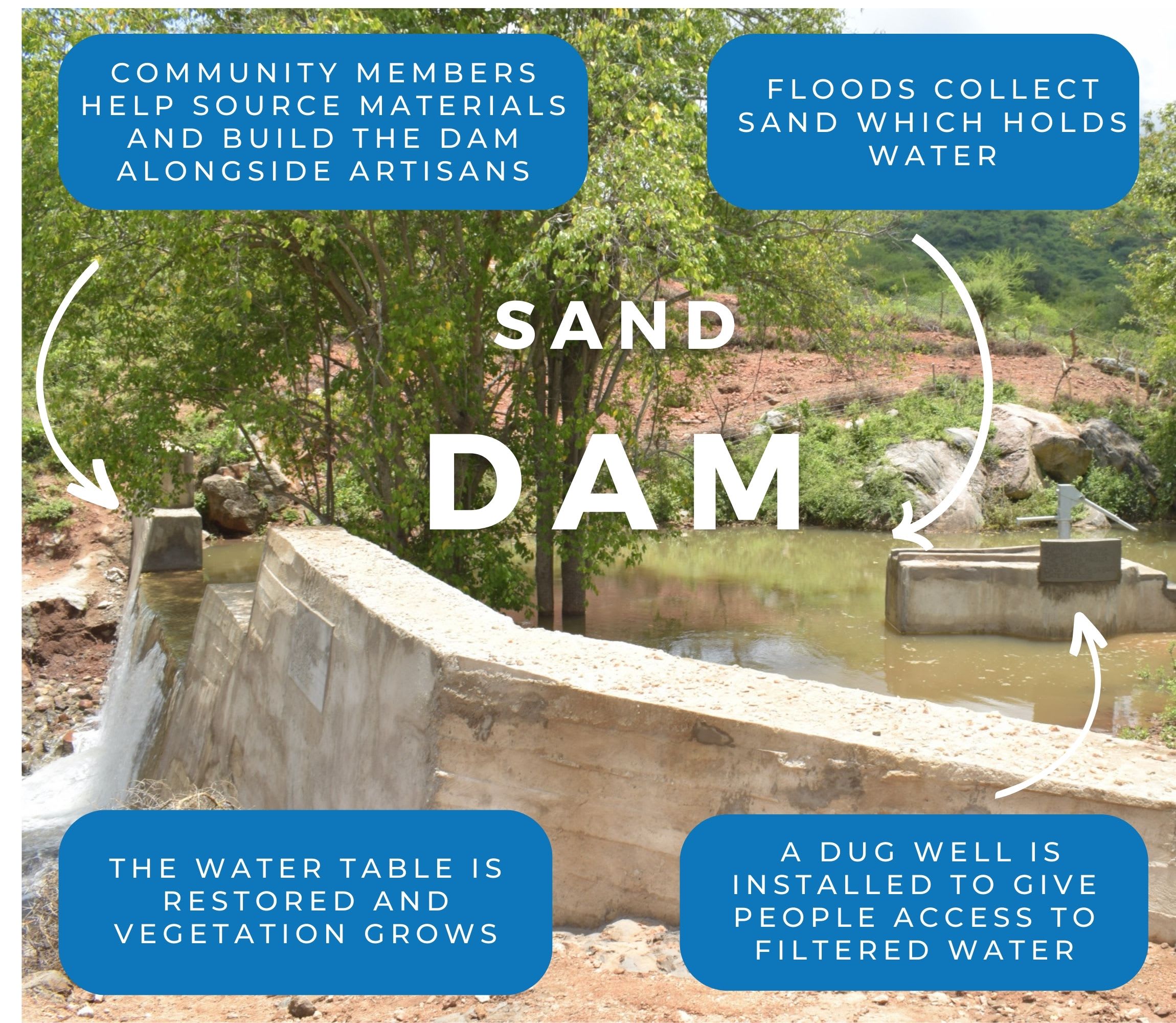This project is a part of our shared program with Africa Sand Dam Foundation. Our team is pleased to directly share the below report (edited for clarity, as needed).
Welcome to the Community
Tei wa Nzung'u Self-Help Group is formed from farmers living in Nzung'u. They came together for the common purpose of helping each other harvest successful crops despite water scarcity and other challenges in the area. Nzung'u Village is located in one of the northernmost parts of Kitui, which is also one of the driest.
These farmers are motivated and encouraged by continued efforts to improve water, sanitation, and hygiene in their large village. There are 880 people living here, spread over miles of land. As more water points are constructed, more families directly benefit. (Editor's Note: While this many people may have access on any given day, realistically a single water source can only support a population of 350-500 people. That has made this community a great candidate for continued support in creating clean water points, and is why they are receiving their second sand dam and hand-dug well. To learn more, click here.)
Before construction of their first sand dam, members of this group would walk for four to five hours to fetch water. That has now changed, and children no longer miss school to fetch water. For most in Nzung'u, walking to their first sand dam and well takes less than thirty minutes.
Water Situation
Water in most parts of Kitui is collected from open scoop holes in their sandy, seasonal rivers. But with their first sand dam, this particular part of the river is no longer seasonal - People can access water at any time of the year. And with the addition of the hand-dug well, people are able to pump water that is safer than what's found in the scoop holes.
All 880 are drawn to the water stored at this first sand dam. Yet such a huge population puts a strain on this single resource, warranting the construction of more water sources. As you can imagine, not all of these 880 are able to wait in line at the hand-dug well.
Water is collected and transported using 20-liter plastic jerrycans. It is then loaded onto donkeys or ox-drawn carts. If a household is too poor to afford either of those, then the last resort is to carry those heavy, full containers on their backs. However, most households have at least one donkey by now. Even better, some households have recently been able to afford motorbikes.
When delivered back home, water is stored in whatever containers could be afforded. Some families can afford large plastic or iron drums of 200 liters, while others cannot afford anything but the jerrycans they use at the dam.
Water treatment has been adopted since last year's training, by either boiling or chlorinating.
Sanitation Situation
Nzung'u families have done so well with implementing their water, sanitation and hygiene action plan. Over 75% of households have sanitation facilities like latrines, bathing shelters, hand-washing stations, dish racks and clotheslines. Even more impressive, all of those hand-washing stations have a cleaning agent like ash or soap. Households have excavated pits for proper garbage disposal and compost.
The kitchen is cleaned on a daily basis, and the entire compound is swept at least every other day. You can see pictures of two different family households in this report.
Plans: Hygiene and Sanitation Review
We will review hygiene and sanitation practices for three days. Our trainers will continue to stress the importance of treating water before consuming it. We will also strengthen the committee in charge of water point management and maintenance, equipping them with the skills to ensure there’s clean water for generations to come.
We will review food preparation, personal hygiene, and latrine maintenance.
The group members who have not yet constructed a hand-washing station will be reminded of its importance in preventing communicable diseases.
Plans: Sand Dam
The Nzung'u Self-Help Group has decided that this second sand dam and hand-dug well system should be constructed further down the river. This will reach group members living farthest away from the first project. The second dam is warranted, as Nzung'u needs more than one water source to serve more people. Their proposed site for this second sand dam was verified by our technical team and found to be suitable. The fact that they are using water from the first dam to grow vegetables also motivated ASDF to support a second system. We estimate that the sand dam will be 34.3 meters long and 4.3 meters high.
As the sand dam matures, it will build up sand and naturally filter the river’s water and the rainwater supplied during the rainy season.
It will raise the water table and transform the land, making it fertile for farming. With the ongoing installation of a hand-dug well (click here to view that project), water from this sand dam will be safely used for drinking.
When visiting the first sand dam, we met 60-year-old farmer Catherine Kasyoka Mwendwa. "Seeing my group members access clean water makes me happy. Take for example my colleague here Masaa Kyomu. She has a toddler. It gives me satisfaction that words can't describe when she doesn't struggle with water collection. This kind of impact makes us work hard on these water projects and motivates us to continue collaborating with ASDF. This projects make us happy," she shared.

 Sand Dam
Sand Dam
 Rehabilitation Project
Rehabilitation Project
































